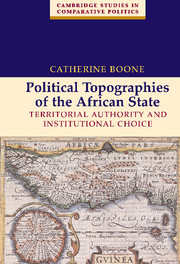Book contents
- Frontmatter
- Contents
- List of Maps, Tables, and Figures
- Preface and Acknowledgments
- 1 INTRODUCTION
- 2 MAPPING POLITICAL TOPOGRAPHY IN AFRICA
- 3 UNEVEN INSTITUTIONAL TOPOGRAPHY WITHIN ONE STATE
- 4 TAXING RICH PEASANTS: REGIME IDEOLOGY AS STRATEGY
- 5 THE GEOPOLITICS OF LATE DEVELOPMENT
- 6 CONCLUSION
- Appendix: A Note on Sources, Evidence, and Measurement
- References
- Index
- Cambridge Studies in Comparative Politics
4 - TAXING RICH PEASANTS: REGIME IDEOLOGY AS STRATEGY
Published online by Cambridge University Press: 26 December 2009
- Frontmatter
- Contents
- List of Maps, Tables, and Figures
- Preface and Acknowledgments
- 1 INTRODUCTION
- 2 MAPPING POLITICAL TOPOGRAPHY IN AFRICA
- 3 UNEVEN INSTITUTIONAL TOPOGRAPHY WITHIN ONE STATE
- 4 TAXING RICH PEASANTS: REGIME IDEOLOGY AS STRATEGY
- 5 THE GEOPOLITICS OF LATE DEVELOPMENT
- 6 CONCLUSION
- Appendix: A Note on Sources, Evidence, and Measurement
- References
- Index
- Cambridge Studies in Comparative Politics
Summary
Southern Côte d'Ivoire and southwestern Ghana lie in a tropical rainforest zone, separated only by a boundary drawn by Europeans in the nineteenth century. Major rivers cross these regions on their way to the Atlantic – the Comoé, the Banadama, the Sassandra, and the Volta. In Côte d'Ivoire, an extensive lagoon system shelters much of the coast from the sea. The terrain is mostly flat, except in the far-western parts of Côte d'Ivoire that border Guinée, and the air is humid. In Ghana, a long coastline of white beaches is dotted with decaying castles and forts that remain from the trans-Atlantic slave trade. Coastal lowlands give way to the gentle slopes and hills of the Asante uplands, which mark the northern limit of the forest zone in these parts. Since about the 1940s and 1950s, farmers in this broad, forested swath of West Africa have been the world's leading producers of cocoa. Southern Côte d'Ivoire is also one of the largest producers of coffee.
Postcolonial rulers in these two regions faced the challenge of governing and taxing export-producing peasantries that have been among the most prosperous in modern Africa. This chapter explains why they chose such different strategies to do so. At the household level, the dynamics of export-crop production in the two regions is similar. And in both zones, the cash crop economy emerged from grassroots dynamics of innovation that involved little direct state intervention.
- Type
- Chapter
- Information
- Political Topographies of the African StateTerritorial Authority and Institutional Choice, pp. 141 - 239Publisher: Cambridge University PressPrint publication year: 2003



